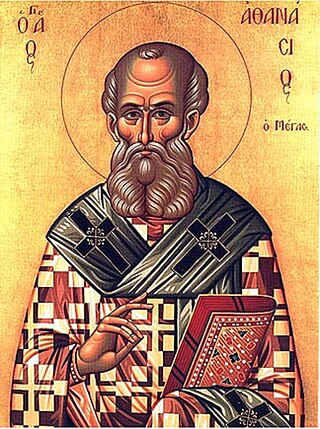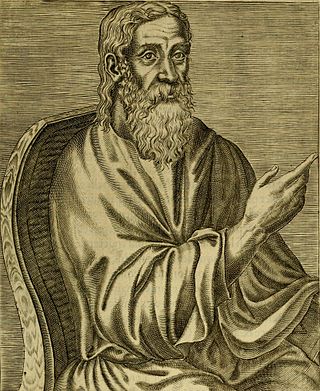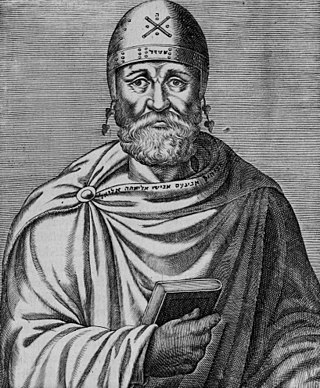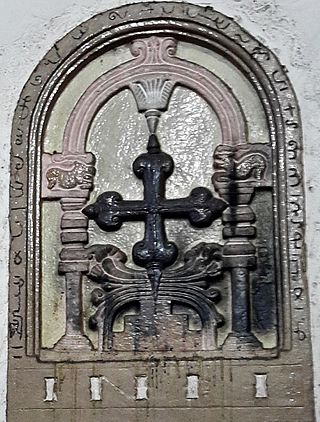Related Research Articles
Arianism is a Christological doctrine considered heretical by all mainstream branches of Christianity. It is first attributed to Arius, a Christian presbyter who preached and studied in Alexandria, Egypt. Arian theology holds that Jesus Christ is the Son of God, who was begotten by God the Father with the difference that the Son of God did not always exist but was begotten/made before "time" by God the Father; therefore, Jesus was not coeternal with God the Father, but nonetheless Jesus began to exist outside time as time applies only to the creations of God.

Athanasius I of Alexandria, also called Athanasius the Great, Athanasius the Confessor, or, among Coptic Christians, Athanasius the Apostolic, was a Christian theologian and the 20th pope of Alexandria. His intermittent episcopacy spanned 45 years, of which over 17 encompassed five exiles, when he was replaced on the order of four different Roman emperors. Athanasius was a Church Father, the chief defender of Trinitarianism against Arianism, and a noted Egyptian Christian leader of the fourth century.

Titus Flavius Clemens, also known as Clement of Alexandria, was a Christian theologian and philosopher who taught at the Catechetical School of Alexandria. Among his pupils were Origen and Alexander of Jerusalem. A convert to Christianity, he was an educated man who was familiar with classical Greek philosophy and literature. As his three major works demonstrate, Clement was influenced by Hellenistic philosophy to a greater extent than any other Christian thinker of his time, and in particular, by Plato and the Stoics. His secret works, which exist only in fragments, suggest that he was familiar with pre-Christian Jewish esotericism and Gnosticism as well. In one of his works he argued that Greek philosophy had its origin among non-Greeks, claiming that both Plato and Pythagoras were taught by Egyptian scholars.

Ezra or Esdras, also called Ezra the Scribe in Chazalic literature and Ezra the Priest, was an important Jewish scribe (sofer) and priest (kohen) in the early Second Temple period. In Greco-Latin Ezra is called Esdras. His name is probably a shortened Aramaic translation of the Hebrew name עזריהו Azaryahu, "Yah helps". In the Greek Septuagint the name is rendered Ésdrās, from which the Latin name Esdras comes.

The Eastern Orthodox Church, officially the Orthodox Catholic Church, and also called the Greek Orthodox Church or simply the Orthodox Church, is the second-largest Christian church, with approximately 220 million baptised members. It operates as a communion of autocephalous churches, each governed by its bishops via local synods. The church has no central doctrinal or governmental authority analogous to the head of the Catholic Church. Nevertheless, the Ecumenical Patriarch of Constantinople is recognised by them as primus inter pares, a title formerly given to the patriarch of Rome. As one of the oldest surviving religious institutions in the world, the Eastern Orthodox Church has played an especially prominent role in the history and culture of Eastern and Southeastern Europe.

The First Council of Nicaea was a council of Christian bishops convened in the Bithynian city of Nicaea by the Roman Emperor Constantine I. “The Council of Nicaea met from May to the end of July 325.”

Imhotep was an Egyptian chancellor to the Pharaoh Djoser, possible architect of Djoser's step pyramid, and high priest of the sun god Ra at Heliopolis. Very little is known of Imhotep as a historical figure, but in the 3,000 years following his death, he was gradually glorified and deified.

The Great Library of Alexandria in Alexandria, Egypt, was one of the largest and most significant libraries of the ancient world. The library was part of a larger research institution called the Mouseion, which was dedicated to the Muses, the nine goddesses of the arts. The idea of a universal library in Alexandria may have been proposed by Demetrius of Phalerum, an exiled Athenian statesman living in Alexandria, to Ptolemy I Soter, who may have established plans for the Library, but the Library itself was probably not built until the reign of his son Ptolemy II Philadelphus. The Library quickly acquired many papyrus scrolls, owing largely to the Ptolemaic kings' aggressive and well-funded policies for procuring texts. It is unknown precisely how many scrolls were housed at any given time, but estimates range from 40,000 to 400,000 at its height.

Origen of Alexandria, also known as Origen Adamantius, was an early Christian scholar, ascetic, and theologian who was born and spent the first half of his career in Alexandria. He was a prolific writer who wrote roughly 2,000 treatises in multiple branches of theology, including textual criticism, biblical exegesis and hermeneutics, homiletics, and spirituality. He was one of the most influential and controversial figures in early Christian theology, apologetics, and asceticism. He has been described as "the greatest genius the early church ever produced".

Philo of Alexandria, also called Philo Judaeus, was a Hellenistic Jewish philosopher who lived in Alexandria, in the Roman province of Egypt.
Nontrinitarianism is a form of Christianity that rejects the mainstream Christian theology of the Trinity—the belief that God is three distinct hypostases or persons who are coeternal, coequal, and indivisibly united in one being, or essence. Certain religious groups that emerged during the Protestant Reformation have historically been known as antitrinitarian.
In Christian theology, divinization, or theopoesis or theosis, is the transforming effect of divine grace, the spirit of God, or the atonement of Christ. Although it literally means to become divine, or to become God, most modern Christian denominations do not interpret the doctrine as implying an overcoming of a fundamental ontological difference between God and humanity; for example, John of the Cross indicated that while "God communicates to it [the individual soul] His supernatural Being, in such wise that it appears to be God Himself, and has all that God Himself has", yet "it is true that its natural being, though thus transformed, is as distinct from the Being of God as it was before".

The Epistle of Barnabas is a Greek epistle written between AD 70 and 132. The complete text is preserved in the 4th-century Codex Sinaiticus, where it appears immediately after the New Testament and before the Shepherd of Hermas. For several centuries it was one of the "antilegomena" ("disputed") writings that some Christians looked on as sacred scripture, while others excluded them. Eusebius of Caesarea classified it with excluded texts. It is mentioned in a perhaps third-century list in the sixth-century Codex Claromontanus and in the later Stichometry of Nicephorus appended to the ninth-century Chronography of Nikephoros I of Constantinople. Some early Fathers of the Church ascribed it to the Barnabas who is mentioned in the Acts of the Apostles, but it is now generally attributed to an otherwise unknown early Christian teacher, although some scholars do defend the traditional attribution. It is distinct from the Gospel of Barnabas.

Arius was a Cyrenaic presbyter, ascetic, and priest. Traditionally, it was claimed that Arius was the founder of the doctrine of Arianism but, more recently, Rowan Williams stated that "Arius' role in 'Arianism' was not that of the founder of a sect. It was not his individual teaching that dominated the mid-century eastern Church."

Serapis or Sarapis is a Graeco-Egyptian god. A syncretic deity derived from the worship of the Egyptian Osiris and Apis, Serapis was extensively popularized in the third century BC on the orders of Greek Pharaoh Ptolemy I Soter, as a means to unify the Greek and Egyptian subjects of the Ptolemaic Kingdom.

Subordinationism is a Trinitarian doctrine wherein the Son is subordinate to the Father, not only in submission and role, but with actual ontological subordination to varying degrees. It posits a hierarchical ranking of the persons of the Trinity, implying ontological subordination of the persons of the Son and the Holy Spirit. It was condemned as heretical in the Second Council of Constantinople.
The Arian controversy was a series of Christian disputes about the nature of Christ that began with a dispute between Arius and Athanasius of Alexandria, two Christian theologians from Alexandria, Egypt. The most important of these controversies concerned the relationship between the substance of God the Father and the substance of His Son.

Christianity is the third-largest practiced religion in Kerala, accounting for 18% of the population according to the 2001 Indian census. According to traditional accounts, Thomas the Apostle sailed to the Malabar region in 52 AD and introduced Christianity to the area. Although a minority, the Christian population of Kerala is proportionally much larger than that of India as a whole. A significant portion of the Indian Christian population resides in the state.

Christianity in late antiquity traces Christianity during the Christian Roman Empire — the period from the rise of Christianity under Emperor Constantine, until the fall of the Western Roman Empire. The end-date of this period varies because the transition to the sub-Roman period occurred gradually and at different times in different areas. One may generally date late ancient Christianity as lasting to the late 6th century and the re-conquests under Justinian of the Byzantine Empire, though a more traditional end-date is 476, the year in which Odoacer deposed Romulus Augustus, traditionally considered the last western emperor.
References
- ↑ McClintock, J.; Strong, J. (1889). Cyclopaedia of Biblical, Theological, and Ecclesiastical Literature. Vol. 12. Harper & brothers. p. 32. Retrieved 2014-12-11.
- ↑ Bright, W. (1903). The age of the Fathers: being chapters in the history of the church during the fourth and fifth centuries. Vol. 1. Longmans, Green. p. 145. ISBN 9780790544922 . Retrieved 2014-12-11.
 This article incorporates text from a publication now in the public domain : Chambers, Ephraim, ed. (1728). Cyclopædia, or an Universal Dictionary of Arts and Sciences (1st ed.). James and John Knapton, et al.
This article incorporates text from a publication now in the public domain : Chambers, Ephraim, ed. (1728). Cyclopædia, or an Universal Dictionary of Arts and Sciences (1st ed.). James and John Knapton, et al.{{cite encyclopedia}}: Missing or empty|title=(help)